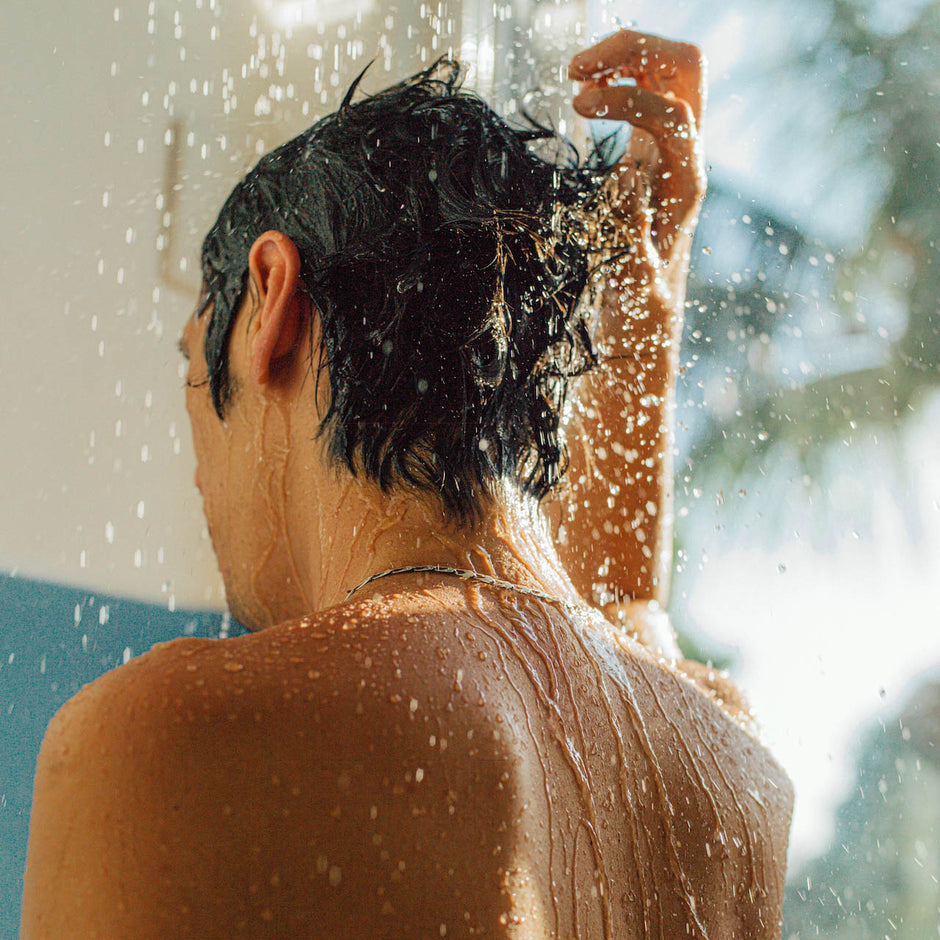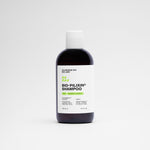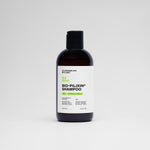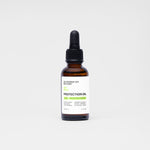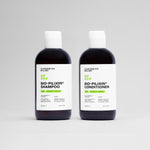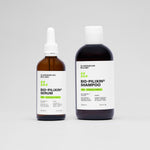To have strong and great-looking hair, it needs shine.
To have shine in your hair, it has to be clean.
And to keep hair clean, you need to wash away dirt and extra oils that can build up after time - just like we all do every day!
That's why washing regularly is so important - especially if you live or work in an urban area. This can seem complicated at first glance because there are so many steps involved, but once you get the hang of it and start doing these simple things every day then life will feel so much easier!
Here are just some of the most asked questions about hair washing that all this time you thought you had the answers. But did you?
[[textbox]]
Table of content
Summary
The frequency of hair washing depends on various factors, including hair type, length, environment, and personal routine. There are no strict rules, but it's important to notice when your hair becomes greasy or dehydrated.
Delaying hair washes can lead to increased grease, which can become sticky as dirt and build-up accumulate on the scalp. Frequent washing may be necessary for those with greasy hair.
Dry hair results from a lack of moisture or natural oils. It's crucial to use a non-drying, nourishing shampoo and focus on moisturizing the ends. Normal hair can generally handle daily washing, but factors like hair length and environmental conditions play a role in determining the washing frequency.
Wet hair is more prone to breakage, especially if combed too vigorously. It's advisable to dry your hair to about 75% before combing and to use a gentle combing method.
[[textbox]]

As your leading source for hair health information over the past 4 years, we never compromise on accuracy. When it comes to your health, you deserve information you can truly rely on - and earning your trust is our top priority.
Here's how Scandinavian Biolabs ensures every piece of content meets the highest standards of accuracy and integrity:
- Credentialed Experts: Our reviewers are actively practicing doctors and medical researchers
- Stringent Reviews: Content undergoes rigorous editing by subject specialists and review by a practicing doctor.
- Evidence-Based: We rely on well-established research from trusted scientific sources like peer-reviewed journals and health authorities.
- Full Transparency: Our editorial standards, writer credentials, reviewer credentials, correction process, and funding are all publicly documented.
- Independent Voice: While we do promote products, we operate in a vacuum to business operations. Our main goal is just an unwavering commitment to providing medically-sound guidance.
You can count on Scandinavian Biolabs to consistently deliver the trustworthy health information you deserve. Read our Editorial Standards.
1. How Often Should You Wash Your Hair?
Is it okay to wash your hair once every week? Or should it be twice a week? How about daily washing?
There are indeed no set-in-stone rules when it comes to hair washing. Your hair properties and personal preferences/routine will determine when the time is right.
It is you who should know best as many factors can come into play: hair type, length, style, the environment where you live and work, the season, your daily activities and hair care/styling routines.
You can go as wild as your hair demands, but typically you should act upon the signs of hair starting to get greasy or dehydrated.
Grease was a great movie but you don't want it in your hair
Despite popular advice, greasy hair worsens with time when you delay the wash. Excess grease may become tacky as dirt and build-ups adhere to the scalp.
These particles may as well enter under the cuticle scales and alter hair properties, i.e. causing hair breakage. Thus, you may need to consider a more frequent hair-washing cycle if this applies to your hair type.
What if the root and scalp are greasy, yet the ends are dry? You can manage the two parts separately, focusing on cleansing at the root and moisturising at the ends.
Also, if for some reason your greasy hair suddenly turns dry, change your routine and start treating it as dry hair.
Dry hair needs a little extra care
Dry hair can stem from low moisture in the hair shaft or a lack of natural oils on the scalp. You need to go easy on the washing cycle with dry hair so as not to further dehydrate it.
The essential rule is to use a non-drying shampoo that is gentle but nourishing. Take extra care with the ends and always condition them to replenish the much-needed moisture and oil.
For normal hair
You can shampoo daily with normal hair, as long as you do not over-wash it (you will notice dryer hair when it happens!).
Regarding length, it is believed that long hair can stay clean longer than short one as sebum works down the shaft less quickly. And other factors like central heating, sweating from exercise, working environment or polluted air can dictate a shorter interval between washes.
Discover more about hair cleansing - All you need to know!
2. Are Two Shampoo Applications Necessary?
It depends on personal preference.
For days when you know your hair has undergone a lot of wear and tear, it might be wise to apply it twice. Some people also feel they need to shampoo two times - one to remove grime like smoke, dirt and grease, and another to thoroughly cleanse their locks.
However, as mentioned before, too much shampooing could cause dryness and roughness, so don’t go overboard. If you already wash daily, it's enough with a light application each time.

3. Does Combing Wet Hair Cause Breakage?
There are two reasons that cause hair breakage.
The first one is breakage due to the normal growth cycle. Each of us has a natural hair break-off point and it is normal if your hair snaps at that stage. Attempting to grow your hair longer than it is capable of will result in breaks no matter whether you comb it wet or dry.
Second, breakage due to personal abuse that alters hair properties. This type includes overly-frequent chemical treatments, insufficient conditioning, and the use of incorrect or poor-quality combs and brushes. Since hair is more pliable when wet, brushing/combing will stretch it and cause a higher chance of breakage.
The suggested method is to dry your hair to 75% before starting to comb it. Still, over-stretching the strands will make your hair snap when it dries.
Your combing method also plays an important role. Never work from the front to the back as you will risk increasing tangles. Instead, work from the ends with care first, and then you can work up to the roots.
4. Should Hair Be Let Dry Naturally Without Heat After Washing?
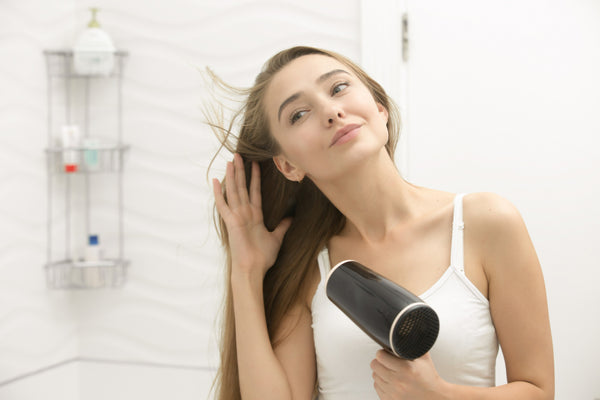
The short answer is No!
People usually suppose that natural drying, exposure to ambient temperature after gently removing excess water and patting dry with a towel, is the safest choice to avoid hair damage.
Interestingly, research has discovered the other way around.
Hair let dry with no support or intervention (i.e., blow-drying) tends to suffer from cell membrane complex (CMC) damage due to the prolonged wet stage.
On average, it takes about 2 hours to dry the hair strands completely. During that time, the hair shaft, as well as the delta layer of the CMC, swells with water.
Extended time in contact with water means a longer swelling condition, which invokes harmful effects on the CMC. Studies even suggested that a long-lasting wet stage is as detrimental as a high drying temperature.
That said, extreme heat will surely damage your hair.
You can use a hair dryer set at a low temperature and a distance of about 15cm. With a continuous motion, you can limit possible heat damage while avoiding the risk of drying hair naturally. Apply a coat of hair oil to protect your strands from the heat is also favourable.
You can also explore this article about a healthy hair regimen to find out what you might be missing when it comes to caring for your locks, or get tips on picking the right hair care product.
Disclaimer:
The information we provide is not intended to mitigate, prevent, treat, cure or diagnose any disease or condition. If you have any concerns about your health, please consult your doctor.
References
Asifa, N., & Kusagur, M. (2017). Prevalent practices and perceptions in hair cleansing. International Journal of Trichology, 9(3).
Cruz, C. F., Costa, C., Gomes, A. C., Matamá, T., & Cavaco-Paulo, A. (2016). Human hair and the impact of cosmetic procedures: a review on cleansing and shape-modulating cosmetics. Cosmetics, 3(3), 26.
Davis-Sivasothy, A. (2011). The science of black hair: a comprehensive guide to textured hair. SAJA Publishing Company.
https://www.healthline.com/health/beauty-skin-care/how-to-wash-your-hair#takeaway
